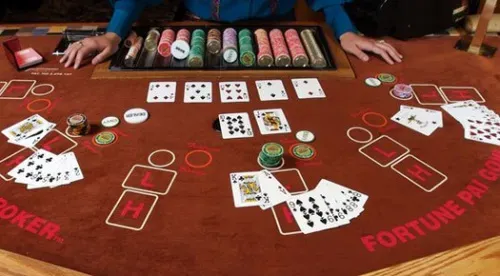For years I have looked at the popular game of Pai Gow Poker (PGP) and scratched my head. How can it be beat? For example, hole-cards are often exposed by sloppy dealers, but seeing one (or even a couple) of dealer hole-cards does little to help the advantage player. Card counting is not possible (the deck is shuffled between rounds). For edge sorting, the success of the sort usually relies on key cards, for example, AKQ for 3CP, AKQJ for MS, AKQJT for BJ. What are the key cards for PGP? Is tracking the joker enough? For collusion, sharing hands would require a non-trivial computer program to analyze. But most importantly, even if full collusion information was available, how does this actually help the player? After all, the only decision the player can make is how to set his hand, and much of the time that is a restricted choice that doesn't allow any information to be used.
Perhaps the most significant evidence that PGP is not vulnerable to AP play is its complete absence from advantage player websites, online discussions and in James Grosjean's books. In over 15 years of involvement in AP websites, I have never sees any discussions about a legitimate edge over PGP, whether on bj21.com, blackjackforumonline.com, bjinfo.com, discountgambling.net, wizardofvegas,com or any other major AP site. I have never seen PGP mentioned as an advantage play. Grosjean's does not even mention PGP in "Beyond Counting" or its follow-up. As far as I know, information and discussions about AP play against PGP simply do not exist.

There are two ways I know that PGP has been beaten, but neither is a method. One way is when a dealer does not set their hand optimally due to poor understanding of the house way. The other way is when a casino creates its own flawed "house way" that yields a player edge with optimal play. Both of these methods are very rare and I would not know how to begin scouting for either. Methods that are opportunistic cannot properly be thought of as a specific game weakness. A Google search ("beating Pai Gow Poker") returns a lot of advice on setting hands, but none of it is consistent with an actual advantage or an AP method.
At some casinos, PGP players are allowed to bank the action of other players in a rotating fashion. One website states, "The best chance a player has of beating Pai Gow is when they are given the chance to Bank on a regular basis." Indeed, it is the only way I know to get an edge-- I doubt any AP will go out of their way for 0.02% to 0.20%.
PGP is enigmatic. APs must have an opportunistic strategy to beat PGP, after all, they know how to beat every game. I've tried my hardest for years to think outside-of-the-box about PGP and I've come up short. I humbly admit that this game has defeated my best efforts to find a way to beat it.


